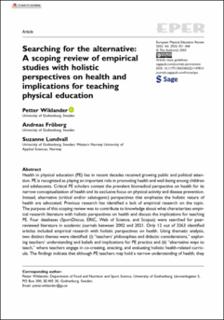| dc.contributor.author | Wiklander, Petter | |
| dc.contributor.author | Fröberg, Andreas | |
| dc.contributor.author | Lundvall, Suzanne | |
| dc.date.accessioned | 2023-09-29T11:45:11Z | |
| dc.date.available | 2023-09-29T11:45:11Z | |
| dc.date.created | 2023-03-29T10:21:27Z | |
| dc.date.issued | 2023 | |
| dc.identifier.citation | European Physical Education Review. 2023, 29 (3), 351-368. | en_US |
| dc.identifier.issn | 1356-336X | |
| dc.identifier.uri | https://hdl.handle.net/11250/3093112 | |
| dc.description.abstract | Health in physical education (PE) has in recent decades received growing public and political attention. PE is recognized as playing an important role in promoting health and well-being among children and adolescents. Critical PE scholars contest the prevalent biomedical perspective on health for its narrow conceptualization of health and its exclusive focus on physical activity and disease prevention. Instead, alternative (critical and/or salutogenic) perspectives that emphasize the holistic nature of health are advocated. Previous research has identified a lack of empirical research on the topic. The purpose of this scoping review was to contribute to knowledge about what characterizes empirical research literature with holistic perspectives on health and discuss the implications for teaching PE. Four databases (SportDiscus, ERIC, Web of Science, and Scopus) were searched for peer-reviewed literature in academic journals between 2002 and 2021. Only 12 out of 3263 identified articles included empirical research with holistic perspectives on health. Using thematic analysis, two distinct themes were identified: (i) “teachers’ philosophies and didactic considerations,” exploring teachers’ understanding and beliefs and implications for PE practice and (ii) “alternative ways to teach,” where teachers engage in co-creating, enacting, and evaluating holistic health-related curricula. The findings indicate that although PE teachers may hold a narrow understanding of health, they are receptive to alternative perspectives and capable of critical reflections and renegotiations, if given appropriate support and opportunities for professional development. Challenging PE teachers’ philosophies and empowering them in the co-creation and implementation of holistic, student-centered curricula can create sustainable opportunities to enhance students’ well-being. | en_US |
| dc.language.iso | eng | en_US |
| dc.publisher | SAGE Publications | en_US |
| dc.rights | Navngivelse 4.0 Internasjonal | * |
| dc.rights.uri | http://creativecommons.org/licenses/by/4.0/deed.no | * |
| dc.title | Searching for the alternative: A scoping review of empirical studies with holistic perspectives on health and implications for teaching physical education | en_US |
| dc.type | Peer reviewed | en_US |
| dc.type | Journal article | en_US |
| dc.description.version | publishedVersion | en_US |
| dc.rights.holder | © The Author(s) 2023. | en_US |
| dc.source.pagenumber | 351-368 | en_US |
| dc.source.volume | 29 | en_US |
| dc.source.journal | European Physical Education Review | en_US |
| dc.source.issue | 3 | en_US |
| dc.identifier.doi | 10.1177/1356336X221147813 | |
| dc.identifier.cristin | 2137959 | |
| cristin.ispublished | true | |
| cristin.fulltext | original | |
| cristin.qualitycode | 1 | |

